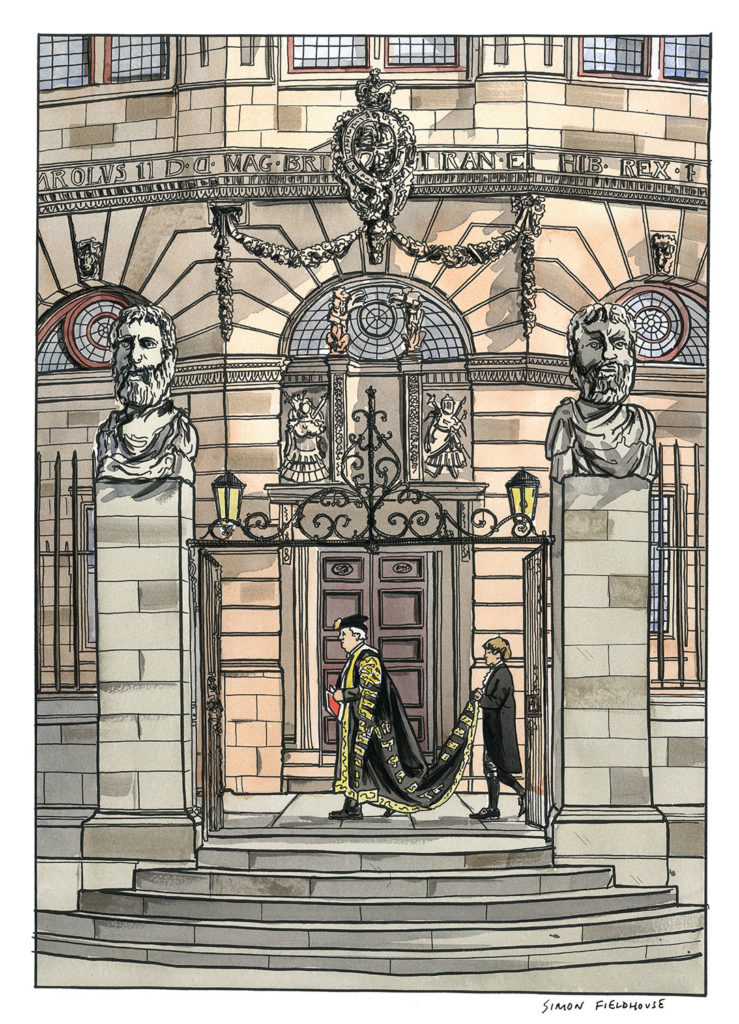
The Sheldonian Theatre and the Chancellor of the University of Oxford
Lord Patten - A Steward of Excellence: Chancellor of the University of Oxford. The role of a university chancellor is one that demands not only prestige and gravitas but also a deep commitment to education, scholarship, and the well-being of the institution. Lord Patten, also known as Chris Patten, has been serving as the Chancellor of the University of Oxford since 2003. His tenure in this esteemed position has been marked by a dedication to upholding the university's traditions and fostering its continued growth and global influence.
Background and Achievements
Lord Patten, a seasoned British politician, and diplomat, boasts a rich and diverse background. Born in 1944, he pursued his education at Balliol College, Oxford, where he studied modern history. This experience laid the foundation for his lifelong commitment to academia. He went on to have a successful political career, serving as the Member of Parliament for Bath and later as the last British governor of Hong Kong. His vast experience in public service and diplomacy made him an ideal candidate for the role of Chancellor at one of the world's most prestigious universities.
Stewardship of Tradition
As Chancellor, Lord Patten has been a steadfast steward of Oxford's rich tradition of academic excellence. He has actively participated in numerous university events and ceremonies, including degree ceremonies, conferring honorary degrees upon distinguished individuals, and overseeing the election of the Pro-Vice-Chancellors. His presence and commitment to these traditions have not only preserved the university's heritage but have also added to the sense of occasion and significance of these events.
Global Expansion
Under Lord Patten's guidance, the University of Oxford has been able to expand its global reach and influence. He has played a pivotal role in promoting international collaboration and fostering partnerships with institutions and organizations worldwide. His efforts have led to a significant increase in the number of international students and scholars coming to Oxford, enriching the university's intellectual and cultural diversity.
Support for Research and Innovation
Lord Patten's commitment to research and innovation is evident in his enthusiastic support for various research initiatives. He has been a vocal advocate for increasing funding for research and has helped establish new research centers and facilities at the university. His dedication to these efforts has been instrumental in Oxford's continued position as a global hub for cutting-edge research and innovation.
Conclusion
Lord Patten's tenure as Chancellor of the University of Oxford has been marked by a steadfast commitment to preserving tradition, expanding the university's global presence, and supporting research and innovation. His deep-rooted connection to Oxford, coupled with his extensive experience in politics and diplomacy, has made him an ideal leader for this prestigious institution. Under his stewardship, the University of Oxford has not only continued its tradition of excellence but has also embraced the challenges and opportunities of the modern world. Lord Patten's legacy as Chancellor will undoubtedly endure, leaving an indelible mark on one of the world's most esteemed centers of learning.
The Sheldonian Theatre and the Chancellor of the University of Oxford hold a special place in the rich tapestry of Oxford's history and culture. These two entities are intertwined, representing the academic excellence, tradition, and prestige associated with this venerable institution.
The Sheldonian Theatre, designed by the renowned architect Sir Christopher Wren, was completed in 1669. It stands as a masterpiece of English Baroque architecture and is a symbol of the University of Oxford. The theatre was commissioned by Gilbert Sheldon, the then-Chancellor of the University and Archbishop of Canterbury, whose vision was to provide a fitting space for the university's graduation ceremonies and other important events. The Sheldonian Theatre remains an iconic venue for these ceremonies, including the conferment of degrees, offering a unique blend of architectural splendor and academic tradition.
The role of the Chancellor of the University of Oxford is equally significant. The Chancellor serves as the ceremonial head of the university, a position of great honor. The Chancellor is traditionally a distinguished figure, often drawn from the world of politics, academia, or the arts. Their responsibilities include conferring degrees at graduation ceremonies and representing the university on various occasions.
The history of the Chancellorship is steeped in tradition, dating back to the earliest days of the university. Notable Chancellors have included influential figures like Sir William Blackstone and Lord Patten. The Chancellor's office is a symbol of continuity, connecting the modern university to its centuries-old roots.
Beyond their individual significance, the Sheldonian Theatre and the Chancellor of the University of Oxford together represent the enduring legacy of Oxford University. They embody the institution's commitment to excellence in education, its rich history, and its continued relevance in the modern world. The Sheldonian Theatre, with its grand architecture, remains a cherished venue for academic events, while the Chancellorship continues to be a symbol of the university's commitment to scholarship and tradition.
In conclusion, the Sheldonian Theatre and the Chancellor of the University of Oxford are inseparable from the history and cultural significance of Oxford University. They stand as enduring symbols of the institution's commitment to excellence, tradition, and the pursuit of knowledge. These two entities continue to play a vital role in preserving and celebrating the rich heritage of one of the world's most prestigious universities.